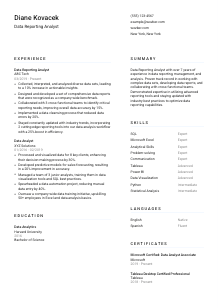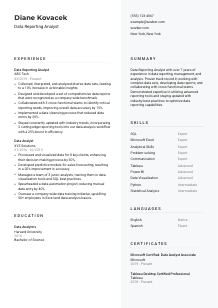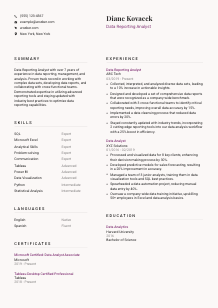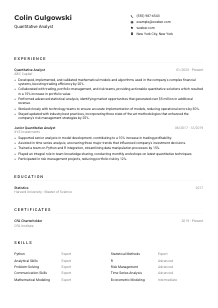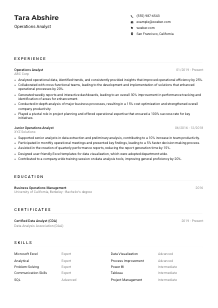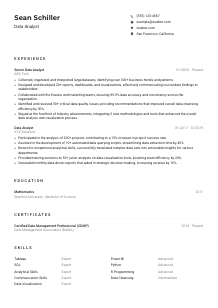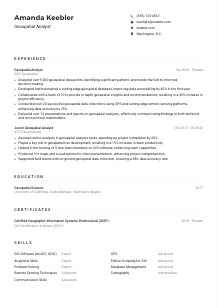Data Reporting Analyst Resume Example
Crunching numbers, but your resume refuses to calculate? Check out this Data Reporting Analyst resume example, generated with Wozber free resume builder. See how seamlessly you can present your analytical insights and reporting prowess to resonate with job digits—making your career graph trend upwards and not just skewing anomalies!
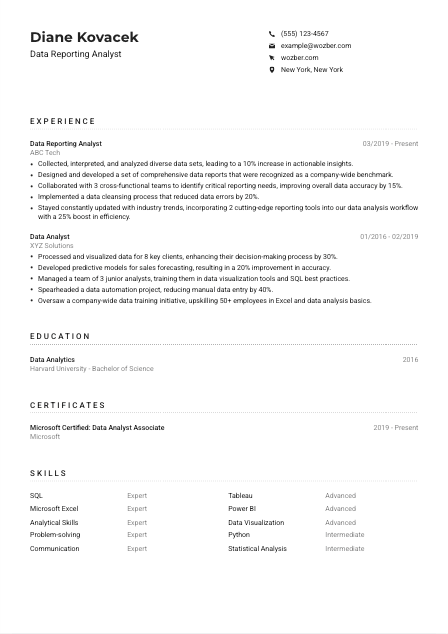
How to write a Data Reporting Analyst resume?
Hello, aspiring Data Reporting Analyst! In the world where data is king, your resume is the key to the kingdom. With the employment scene more competitive than ever, a resume isn't just a piece of paper; it's a sharp tool to carve your way into your dream job. Leveraging Wozber free resume builder, this guide will navigate through crafting a resume that zooms in on what hiring managers in data reporting are keenly looking for.
Ready to dive into the data-driven journey of sculpting your resume into one that outshines? Buckle up!
Personal Details
First impressions matter, especially on paper. Your Personal Details section is the handshake before the conversation, setting the stage for your ATS-compliant resume. Here's how to ensure your introduction doesn't just pass the Applicant Tracking System (ATS) but grabs a hiring manager's attention right from the get-go.
1. Name Loud and Clear
Mirror the job title directly from the job description. Position this right beneath your name to instantly align with the role, specifying you're the "Data Reporting Analyst" they're seeking.
3. Essential Contact Channels
A direct line to reach you is key: a phone number without typos and a professional email format, like firstname.lastname@domain.com, are non-negotiable. For a Data Reporting Analyst, listing your LinkedIn or GitHub could provide quick access to your professional projects.
4. Location Match
"New York, New York." Highlighting your location as same as the job's promises ease of onboarding without the hiccup of relocation logistics. For a bustling data hub like New York, proximity can be a plus.
5. Web Presence
Linking to a professional website or portfolio can provide an immediate, deeper dive into your achievements. Ensure this content is clean, up-to-date, and reflects your skills in data analysis and reporting.
Takeaway
Each detail in this section is a thread in the weave of your professional persona. Ensure they bind together seamlessly, presenting you as a strong, local candidate ready to take the data world by storm.





Experience
The Experience section is where your career narrative comes to life, tailored to showcase your fit for the Data Reporting Analyst role. It's all about painting your professional journey in a light that closely matches the job at hand. Let's dig into curating an experience section that makes the hiring manager nod in approval.
- Collected, interpreted, and analyzed diverse data sets, leading to a 10% increase in actionable insights.
- Designed and developed a set of comprehensive data reports that were recognized as a company‑wide benchmark.
- Collaborated with 3 cross‑functional teams to identify critical reporting needs, improving overall data accuracy by 15%.
- Implemented a data cleansing process that reduced data errors by 20%.
- Stayed constantly updated with industry trends, incorporating 2 cutting‑edge reporting tools into our data analysis workflow with a 25% boost in efficiency.
- Processed and visualized data for 8 key clients, enhancing their decision‑making process by 30%.
- Developed predictive models for sales forecasting, resulting in a 20% improvement in accuracy.
- Managed a team of 3 junior analysts, training them in data visualization tools and SQL best practices.
- Spearheaded a data automation project, reducing manual data entry by 40%.
- Oversaw a company‑wide data training initiative, upskilling 50+ employees in Excel and data analysis basics.
1. Role Relevance
Align your previous roles with the job requirements. For each position, craft bullet points that resonate with tasks like data collection, analysis, and reporting, mirroring the specifics of the job description.
2. Chronology and Clarity
Adopt reverse chronological order to shine the spotlight on your most recent triumphs. Each segment should cleanly state your title, the company's name, and your tenure there.
3. Accomplishments that Speak
Lean on specific achievements, especially those quantifiable. If an initiative you led resulted in a
4. Metrics that Matter
Numbers tell a compelling story. Define your experience not just through duties performed but the measurable success these duties earned, such as improved efficiency or data error reductions.
5. Relevance Rules
Stick strictly to experiences that make sense for a Data Reporting Analyst role. Your prowess in other areas may be impressive, but if it doesn't tie back to the job at hand, save it for the interview.
Takeaway
This section is your proof in practice, showcasing not just what you've done, but how what you've done aligns directly with what you'll be doing. With each bullet point, reaffirm your candidacy as a perfect puzzle piece for the Data Reporting Analyst position.
Education
While it might seem straightforward, your Education section carries weight, particularly in a field that values technical and analytical prowess. Let's ensure your academic background checks out as a solid foundation for a Data Reporting Analyst.
1. Degree Specificity
Lead with your degree, especially if it echoes the job's requirements – like a Bachelor's in Data Analytics or a related field. This direct correlation emphasizes your educational alignment with the role.
2. Layout Simplicity
Maintain a clean and clear format listing your field of study, degree, institution, and graduation date. Anything that could hassle the ATS or a busy hiring manager should be streamlined.
3. Degree Relevance
For a Data Reporting Analyst, the relevance of your degree cannot be overstated. Position your Bachelor of Science in Data Analytics upfront to underscore its direct application to the role.
4. Course Highlights
While not always necessary, mentioning pivotal courses relevant to data reporting and analysis can bolster your candidacy, particularly for those early in their career or transitioning from a different field.
5. Academic Achievements
Significant projects, thesis work, or relevant extracurriculars that showcase your analytical rigor can be worth a mention, but weigh their relevance against the role level and years of experience required.
Takeaway
Even as you climb the career ladder, your educational foundation in data analytics remains a cornerstone. Make sure it's laid out in your resume as a testament to your preparedness for the Data Reporting Analyst role.
Certificates
Certificates are your arsenal in the battle for standing out. They validate your skill set and show a commitment to growing your expertise. For a Data Reporting Analyst, the right certificates could just tilt the scales in your favor.
1. Matchmaking with Job Requirements
Focus on listing certifications that ring closest to the role's skill set. This targeted approach ensures the hiring manager spots the most relevant credentials at first glance.
3. Date Details
Including acquisition or expiration dates for certificates, especially in fast-evolving tech areas, lends credibility and showcases your continual learning efforts.
4. Continuous Learning
Data trends evolve; so should you. Regularly renewing old certificates and chasing new ones, particularly those spotlighted by industry trends, keeps your skill set sharp and resume fresh.
Takeaway
Certificates are not just badges of honor; they are concrete evidence of your mastery and commitment to excellence in data reporting and analysis. Choose wisely and keep them updated.
Skills
The Skills section is the quick snapshot hiring managers use to assess if you're equipped for the war on data. It's crucial, then, that this section is both a mirror of the job requirements and an honest reflection of your capabilities.
1. Skill Identification
Start by dissecting the job description for both hard and soft skills required. For a Data Reporting Analyst role, proficiency in SQL, Tableau, Power BI, and analytical thinking are paramount.
2. Proper Highlighting
Use a mix of hard and soft skills from the job posting that match your skillset. Prioritize them to catch the ATS's attention and subsequently, the hiring manager's eye.
3. Tidy Organization
Resist the urge to list every skill you possess. A cluttered section might confuse the ATS and the hiring manager. Focus on a clean, targeted list that speaks directly to the Data Reporting Analyst role.
Takeaway
Your skills are a pivotal part of the resume, acting as bait for the ATS and a quick reference for decision-makers. Calibrate them to match the job description, proof of not just your eligibility, but your suitability for the role.
Languages
The global marketplace values linguistic dexterity, more so in professions that deal with data analysis and reporting. Aligning your language skills with job demands amplifies your appeal, showcasing you as a versatile asset.
1. Job Requirement Alignment
"Must have the ability to write clearly in English." This requirement underscores the emphasis on communication in data reports. Highlight your proficiency in English prominently.
2. Essential Language Highlighting
Prioritize languages mentioned in the job posting or relevant to the data reporting field. Your fluency in English and additional languages like Spanish enriches your profile for a multifaceted team.
3. Comprehensive Listing
Even if not requested, outlining your multilingual abilities portrays you as a global communicator, capable of diverse interactions. List languages known, with proficiency levels clearly marked.
4. Honest Proficiency
Employ clear, universally understood terms to describe your language level. Overstating your proficiency can backfire, while underplaying it might sell you short. Accuracy is key.
5. Role's Global Dimension
Consider the career opportunities a Data Reporting Analyst may have in global data centers or multinational companies. Your language skills can be an attractive proposition for employers looking beyond local horizons.
Takeaway
Your linguistic prowess is more than a skill; it's a connector in the vast world of data. Flaunt it responsibly, matching it with the job's scope, and let it add a distinctive layer to your resume.
Summary
A gripping summary can inspire a hiring manager to delve deeper into your resume. Here's how to tailor one that not only encapsulates your essence as a Data Reporting Analyst but also emphasizes your alignment with the targeted role.
1. Role Insight
Initiate with a profound understanding of the job. A well-tuned summary acknowledges the essence of being a Data Reporting Analyst, expressing how your journey intersects with this path.
2. Personal Introduction
Begin with an affirmation of your profession and experience level. A statement identifying you as a dedicated Data Reporting Analyst with years of meaty experience sets a strong foundation.
3. Key Skill and Achievement Highlighting
Pinpoint your skill set and most impressive feats. Mention your adeptness with SQL, your hand in maximizing actionable insights by a significant percentage, or your knack for reducing data errors.
4. Brevity
While it's tempting to pour all your achievements into the summary, remember it's an appetizer, not the main course. A crisp, enticing introduction entices hiring managers to keep reading.
Takeaway
Your summary is your pitch, your chance to say, 'I'm exactly who you need for this Data Reporting Analyst role.' Tailor it with precision, and let it echo your readiness to dive into data's depths.
Embarking on Your Data Reporting Analyst Career Path
Congratulations! You've now dissected and understood how to curate a resume that speaks the language of data reporting and analysis, specifically tuned for a Data Reporting Analyst role. Use this guide as your blueprint, Wozber's free resume builder for design and optimization, and step into the realm of data with confidence. The path ahead is data-driven; your resume, the passport. Go ahead, the world of data reporting awaits your unique insights.

- Bachelor's degree in Data Analytics, Business Intelligence, Computer Science, or a related field.
- Minimum of 3 years of experience in data reporting, data analysis, or a related role.
- Proficient in SQL, data visualization tools (e.g., Tableau, Power BI), and Microsoft Excel.
- Strong analytical, problem-solving, and communication skills.
- Relevant certifications such as Microsoft Certified: Data Analyst Associate or Tableau Desktop Certified Professional are a plus.
- Must have the ability to write clearly in English.
- Must be located in New York, New York.
- Collect, interpret, and analyze data to provide actionable insights and recommendations.
- Design, develop, and maintain data reports, dashboards, and visualizations.
- Collaborate with cross-functional teams to identify reporting needs and improve data accuracy.
- Ensure data quality by conducting regular audits, troubleshoot data errors, and implement data cleansing processes.
- Stay updated with industry best practices and new reporting tools to optimize data reporting capabilities.





